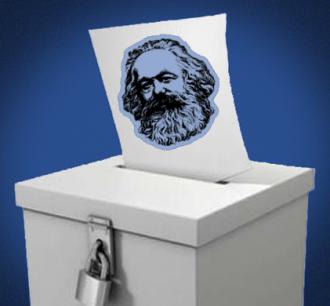Welcome to DU!
The truly grassroots left-of-center political community where regular people, not algorithms, drive the discussions and set the standards.
Join the community:
Create a free account
Support DU (and get rid of ads!):
Become a Star Member
Latest Breaking News
Editorials & Other Articles
General Discussion
The DU Lounge
All Forums
Issue Forums
Culture Forums
Alliance Forums
Region Forums
Support Forums
Help & Search
Socialist Progressives
Related: About this forumElections and Marxism
So elections may be an excellent means to amplify the socialist message and organize and give shape to movements that develop outside the electoral sphere. But socialism cannot be legislated into existence. The absolute precondition in the U.S. to the building of a genuine socialist movement, embracing millions of workers, the poor and the oppressed, is breaking from the limits imposed by the two-party system and creating a party of workers and the oppressed. But for the socialists to fully succeed in their project, there must be a revolutionary struggle that moves far beyond the limits of our rigged democracy.
Elections and the Marxist tradition
Paul D'Amato, author of The Meaning of Marxism, looks at how socialists--from the time of Marx and Engels through today--have approached politics and voting.
April 26, 2016
THERE IS a still-widespread fallacy that Marxism cares only about economics.
It is certainly true that Marxists believe the economic relations of society constitute its foundation, and you can't understand the dynamics of a particular society unless you understand its underlying relations of production--and, in particular, its class relations. "What distinguishes the various economic formations of society," wrote Marx in Capital, "is the form in which...surplus labor is in each case extorted from the immediate producer, the worker."
But just as a house is more than its foundation and supports, so capitalism is more than its economic structure. As Marx famously wrote in his Preface to A Critique of Political Economy, a "legal and political superstructure" arises on this foundation, "to which correspond definite forms of social consciousness."
One key component of this superstructure is the state, which has, at its core, agencies of coercion and vast official bureaucracies, but also legislative and executive bodies that change hands between competing political parties, at least in systems where elections are held. Engels described the modern state, even in its most democratic form, as "the organization which the ruling classes--landowners and capitalists--have provided for themselves in order to protect their social privileges." ...
more here: https://socialistworker.org/2016/04/26/elections-and-the-marxist-tradition

1 replies
 = new reply since forum marked as read
Highlight:
NoneDon't highlight anything
5 newestHighlight 5 most recent replies
= new reply since forum marked as read
Highlight:
NoneDon't highlight anything
5 newestHighlight 5 most recent replies
Elections and Marxism (Original Post)
TBF
Apr 2016
OP
guillaumeb
(42,649 posts)1. Recommended. And equally important:
when Marx wrote:
As Marx famously wrote in his Preface to A Critique of Political Economy, a "legal and political superstructure" arises on this foundation, "to which correspond definite forms of social consciousness."
this social consciousness also creates and defines the limits of acceptable thinking. Noam Chomsky writes about what we can think. And what we can think arises from our socialization.
Thus when President Obama talked about changing the US healthcare system, he of course framed the solution in terms friendly to capitalism. He, like most modern Presidents, is a believer in Capitalism the religion as well as the capitalist system as it exists in the US. So any solution to a problem that, ironically, is created by capitalism, must embrace further capitalist solutions that just happen to further enhance the ability of big business to monetize healthcare.